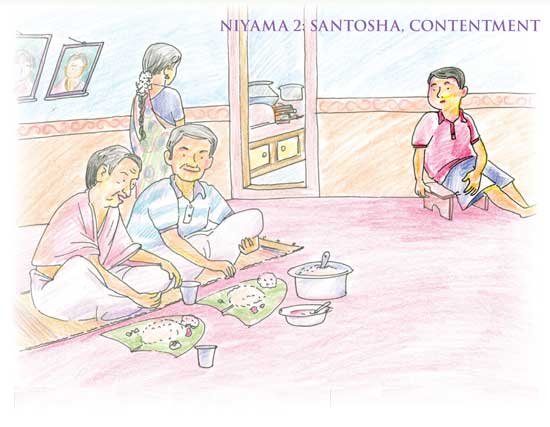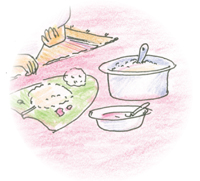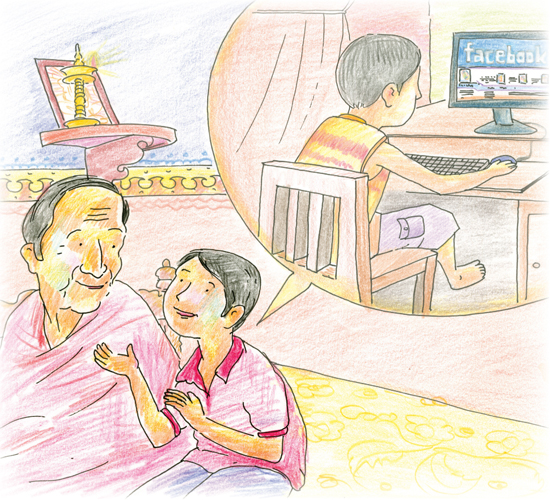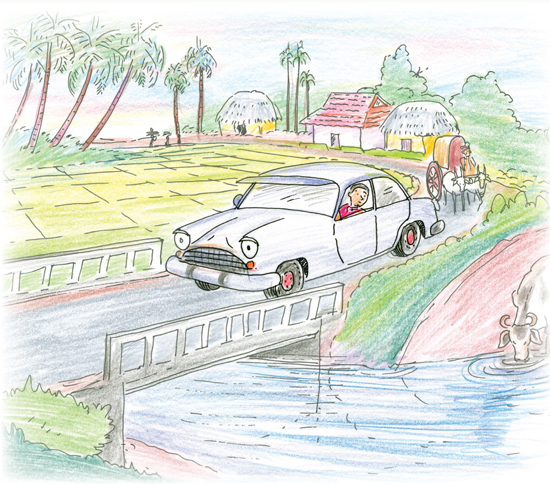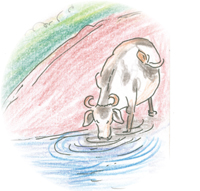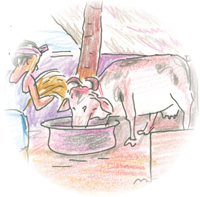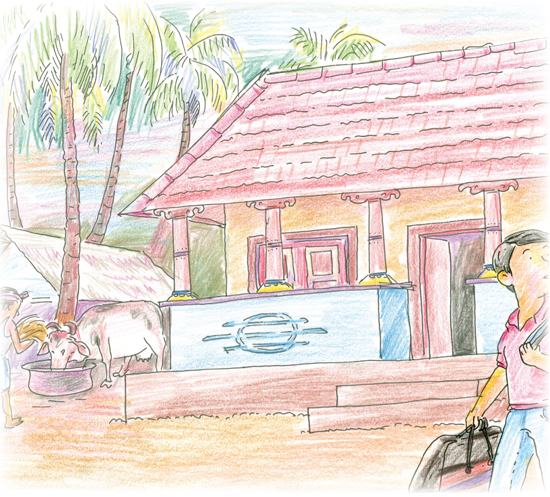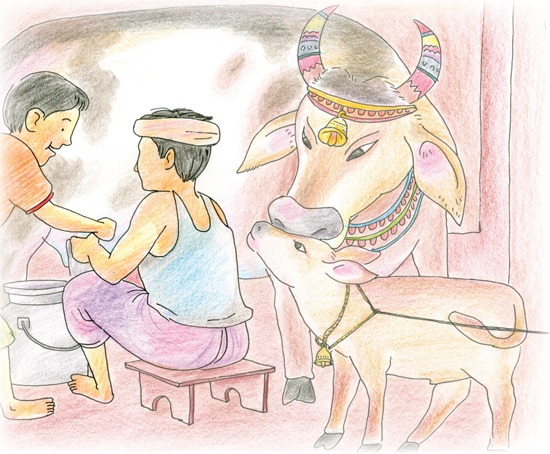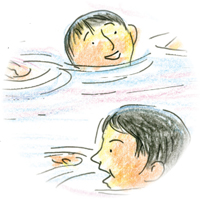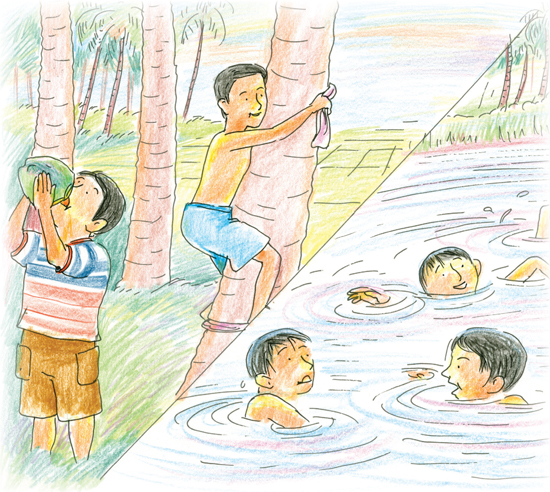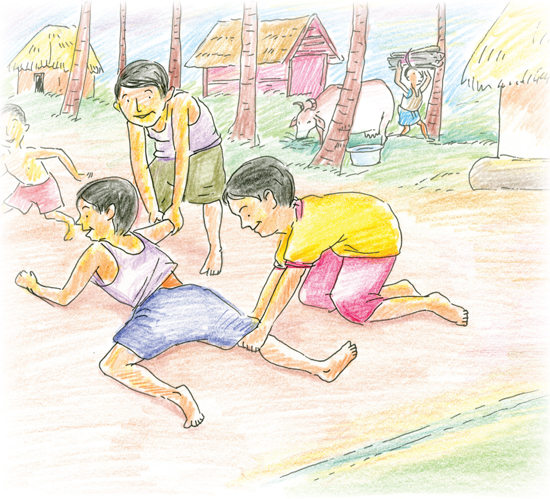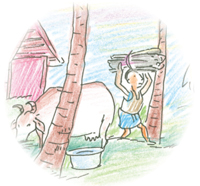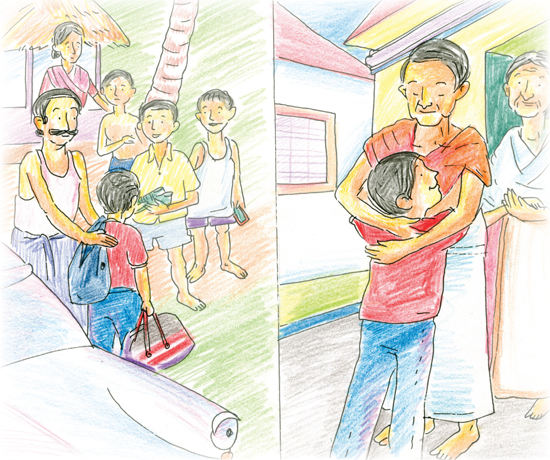Be Satisfied with What You Have
Yogesh’s parents seemed to have no time for him ever since they arrived in Chennai two days ago. His mother jabbered endlessly with relatives, and his father seemed mostly interested in sitting down for meal after home-cooked meal. His grandpa and grandma made a fuss over him; but even though they spoke English, they could not understand his American accent. He knew enough Tamil to communicate. His mother had insisted he learn, but he had never been comfortable with it.§
He was not interested in being taken to the beach, nor for ice cream. He wanted to play on a computer, but this house did not have one. He asked his mother to buy one, but Grandpa laughed at the idea and said, “After you go back to the US, what will I do with a computer? This old man doesn’t even know how to operate a TV remote!”§
Yogesh wished he found it as funny as his grandpa did. Somehow he couldn’t help feeling irritated with his relatives. So what if they were in India? Couldn’t they be more modern? He could not imagine anyone in the US living without a computer.§
One day as they sat together, Grandpa asked Yogesh, “What do you play back home?”§
“I play on my Xbox and Nintendo.”§
“Are they your friends?”§
Yogesh groaned, “Grandpa, they are game consoles that you connect to your television and play.”§
“Oh! Then what about friends?”§
“Friends? I have more than 200!”§
“200? That’s a lot for a young boy!” said Grandpa. “Where did you meet them?”§
“On Facebook.”§
“Where is Facebook? Is that a park?” asked Grandpa innocently.§
“Grandpa,” exclaimed Yogesh with growing frustration, “Facebook is an Internet social networking site where people meet and interact.”§
“Without seeing each other?” Grandpa was amazed.§
Yogesh offered eagerly, “Yes. You should get yourself a computer too, and make some good friends. There are lots of interesting people out there.”§
Grandpa grew silent for a few minutes, deep in thought. Then he asked, “Do you like India?”§
“Frankly, no! There’s nothing to do here. The boys are playing cricket all the time. When I try to teach them baseball, they laugh at me. I miss my games and my computer.”§
Grandpa suggested, “In that case, instead of being stuck here, I think you should go and see our family’s native village. You can stay with your great uncle, my brother. It’s a few hours’ drive from here.”§
Figuring that it couldn’t be worse than being here, Yogesh agreed. The next day, he got into a hired car and left for the village.§
He rolled down the windows, and a warm breeze blew into the car. He watched the passing scenery. Soon the city was far behind them. Green rice fields lined each side of the road their car shared with bullock carts, huge buses and trucks. The green complemented the blue of the sky, and the scene was pretty.§
It was evening when they reached Nattrampalli, a little village outside Vellore. The car bumped down a narrow side road for at least a kilometer, then stopped. They got out near a cow shelter. Outside the barn, a white cow mooed at them loudly. Yogesh peeped around the side and saw a small calf grazing on tender grass.§
A short distance away, he saw a whitewashed house with a little lamp hanging outside. His great uncle, Abhiraman, came out and paid the driver.§
“Son, welcome home,” he said with a toothless smile.§
Yogesh walked into the house. His grandpa’s home in Chennai was spartan, but it was a palace compared to this place. There was absolutely nothing here. No sofa, no dining table—no furniture whatsoever, except for a cane bed, a few mats and some large gunny bags filled to bursting with grains.§
He ran out to get back in the car, but to his dismay, it was disappearing into the distance. A tear rolled down his cheek. How he hated this! Why had he agreed to come? Why had Mom let him go, knowing what it would be like?§
“Where’s the bathroom?” he asked Uncle.§
“Bathroom? Come with me,” replied Abhiraman, and took him to a roofless room through which the moon shone down.§
He didn’t remember the rest of the evening. He had fallen asleep, sad and upset, on the simple cane bed.§
In the morning, a tender breeze blew in and woke him up.§
“Uncle, where’s the shower?” Abhiraman led him to the well and showed him how to bring up buckets of water to pour over his body.§
Yogesh found that he was not as upset as he had been yesterday. “Well, this is a different way to bathe,” he thought, “but it works.”§
He returned to the cottage, where his uncle was holding a glass of frothy milk for him.§
“Where do you buy milk, Uncle? Is there a supermarket nearby?” asked Yogesh hopefully.§
“There are no shops here. We produce our own food. The milk is fresh from our cows. Do you know how to milk a cow?”§
“No...” replied Yogesh.§
“Well, then, it’s time to learn.” Yogesh soon found himself sitting on a short stool next to an 800-pound cow.§
Milking the cow was not easy but, Yogesh had to admit, it was fun. He was actually starting to enjoy himself!§
In the distance, he saw a boy around his own age who was leading a small herd of goats. Shyly he walked up and introduced himself, using the best Tamil he could muster. The boy, Mani, had dark skin, a mop of curly hair and shining white teeth.§
Within a few minutes the two felt like old friends. Mani asked, “Do you want to see some of the things we do here in the village?”§
Yogesh felt a surge of excitement. “Sure! I’d like that,” he said, thinking of the stories he will have to tell his friends back in the US.§
As Mani herded the goats forward with a sturdy stick, they set off on a path between green paddy fields. Soon they came upon a coconut grove. Mani climbed up a tree and threw down a tender coconut. Slipping back down, he chopped an opening in the coconut and gave it to Yogesh. “Drink this!”§
Yogesh drank it eagerly. “This is the sweetest tasting water on earth! Wow!”§
Next Mani guided them to a hill where a group of boys were playing. Mani called out to them, “Come and meet Yogesh; he is from Bombay!”§
Yogesh shot back, “Not Bombay! USA!”§
“It doesn’t matter. For us, both are the same!”§
Yogesh laughed at the statement and suddenly felt lighthearted. These boys had a simple and easy view of life. In their company, he began to relax.§
They climbed the hillock and ate wild berries. They swam in the lake on the other side, and Mani dug up some kind of root vegetable and roasted it on an open fire. When the sun started nearing the horizon, they headed back home.§
When they reached the house, Uncle Abhiraman was standing outside with a worried look on his face. But when he saw Yogesh’s excitement, he smiled and called him in for supper—freshly cooked rice with sambar and fried potatoes. Mani said goodbye and herded the goats to his family’s home. Hungry and tired, Yogesh ate heartily.§
That night, as he lay in the cane bed, he watched the stars outside twinkling merrily, and he saw a few fireflies behaving like stars on Earth.§
The next morning, after bathing at the well, he milked the cow—with more than a little help from Uncle—and collected some vegetables from the garden.§
Soon Mani came for him. Today Yogesh asked permission, “Uncle, may I go out with Mani this morning?”§
“Certainly! Have a good time together.”§
With a big “Thank you!” the two set off to the hillock. This time, the boys wanted to play some games. They taught him marbles and kabaddi. He found that playing marbles was difficult, but kabaddi was easy for him. He enjoyed scuffling around on the ground, pushing, pulling and tugging. It was a bit like tag, but with a lot more running, plus you have to hold your breath for part of it.§
Although he washed his clothes at the well every day, his new jeans were soon a dirty brown color. His t-shirt, too, looked like it had seen better days. But Yogesh couldn’t care less.§
What amazed him the most was that everyone in the village was happy. When he arrived, he had thought, “This is a such a poor village.” But after a few days, he couldn’t figure out what they were missing. They had good, fresh food, they had comfortable houses, they had the beauty of nature, and they had each other. Nobody felt they needed computers, TV, Internet, or even iPhones. They were totally content.§
The next few days passed quickly in a similar fashion. Soon it was time to head back to Chennai. Yogesh decided to give a gift to each of the boys. They flocked around him as he dug into his bag for things to give away. He gave his watch to Mani. “My goodness!” Mani shouted, “This is beautiful. Thank you. I don’t really need it, since I can tell the time by the sun. But it looks good, and it makes me feel like a man.”§
To Sagar, one of the kabbadi players, he gave his best pair of sneakers. To little Varendra he presented his hand video game. The boy tried to put it in his shorts pocket, which was torn, and the console kept falling out. Yogesh wasn’t really sure what Varendra would do with it, but at least it would be a souvenir of his visit.§
As Yogesh watched the car approach, his uncle and a few villagers came and stood by him. Yogesh turned to Abhiraman, “Uncle, thank you for everything. Thank you for teaching me how to milk the cow and thank you for teaching me that I don’t need expensive gadgets to be content. These have been the happiest few days of my life.”§
Varendra was beginning to cry, and Mani looked like he too might shed a tear. Yogesh hugged Mani, “I will come back next year to see you. I promise! I will write letters from America, too.”§
As the car neared Chennai, Yogesh realized that he had not even thought of his computer for a week. He didn’t miss his games, and he felt no need to check up on his 200 Facebook friends.§
All the relatives were waiting to greet him as the car pulled into the driveway. Yogesh jumped out and hugged his grandpa. “Thank you for sending me to our native village. It was the greatest experience of my life. I was so happy there, and now I know I can be happy anywhere!”§
